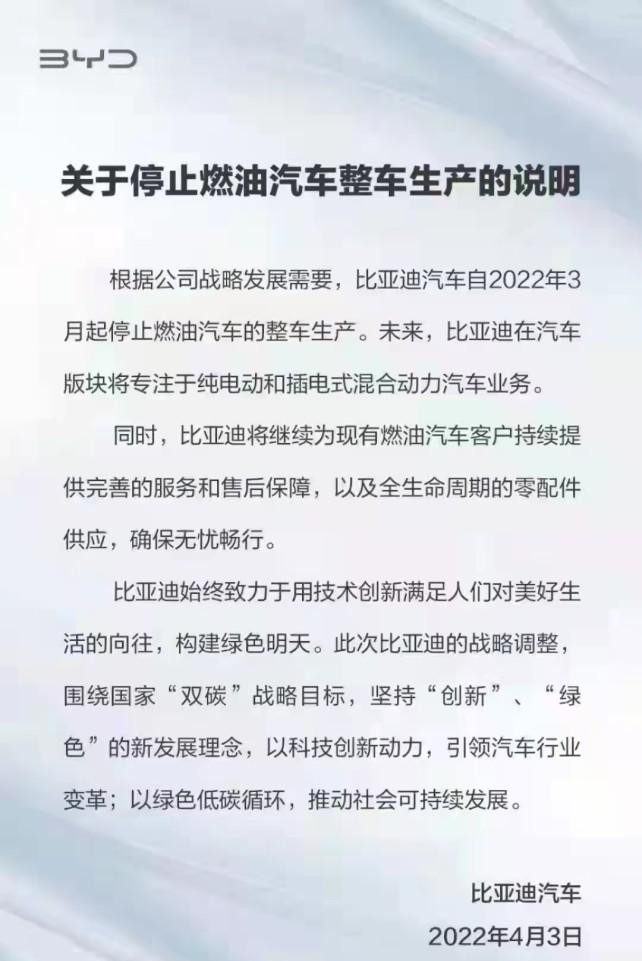On April 3, BYD announced that it will stop production of fuel vehicles from March 2022 in line with the company's strategic development needs. Next, BYD Automobile will focus on pure electric and plug-in hybrid vehicles. At the same time, BYD Automobile will continue to produce and supply fuel vehicle parts, provide continuously perfect service and after-sales guarantee for existing fuel vehicle customers, and supply spare parts throughout the life cycle to ensure worry-free travel.

BYD also said that this strategic adjustment is centered on the national "double carbon" strategic goal, adhere to the new development concept of "innovation" and "green", and lead the transformation of the automotive industry with scientific and technological innovation as the driving force to achieve environmental protection and achieve the global goal of carbon peaking and carbon neutrality.
At the same time, as a non-renewable freedom, as well as the shortage caused by the impact of the international situation, the international oil price continues to rise, and it is increasingly becoming a burden on consumers, which has further become an opportunity for the comprehensive development of new energy vehicles.
In fact, with the development of vehicle electrification, countries around the world have also said that they will ban the sale of fuel vehicles, and have given a corresponding timetable, such as the European Union and Japan said that they will ban the sale of fuel vehicles in 2030, while Singapore and Canada have said that they will ban the sale of fuel vehicles in 2040. In China, in the "Energy-saving and New Energy Vehicle Technology Roadmap 2.0" released in 2020, it is mentioned that the proportion of new energy sales will be increased to 50% around 2030.
Under this general trend, traditional car companies have also embraced the tide of electrification and set up a corresponding timetable for stopping production and stopping the sale of fuel vehicles. For example, Changan Automobile plans to stop selling traditional fuel vehicles in 2025, Honda will stop selling fuel vehicles to the domestic market in 2030, and Volkswagen will also stop selling fuel vehicles in the EU market in 2035. BYD took the lead in taking this step, becoming the first car company in the world to officially announce the suspension of fuel vehicles.
As the earliest domestic layout of electric vehicles, power batteries enterprises, BYD has maintained a rapid pace in the process of electrification, fuel vehicles in BYD's sales has been very small. In this regard, WANG Chuanfu, chairman and president of BYD, said at the recent Electric Vehicle 100 Forum that the replacement of fuel vehicles by new energy vehicles will be faster in the future, and it is expected that by the end of 2022, the penetration rate of domestic new energy vehicles will reach 35%.
Referring to BYD's past sales, in the first two months of this year, new energy vehicles have accounted for more than 97% of ALL OF ATD's model sales. According to the production and sales express report released by BYD on April 3, BYD has produced and sold 0 fuel vehicles in March 2022. Judging from the data, BYD fuel vehicles have gradually withdrawn from the market in the past period of time.
BYD's March production and sales report also shows that in March this year, the output of new energy vehicles in March was 106658, and the sales volume was 104878, while the output and sales of fuel vehicles in March were 0. This means that in March this year, BYD's production and sales have been fully electrified.
In terms of technology, BYD adheres to the independent research and development of core technologies in the whole industry chain of new energy, masters the core technologies such as DM-i super hybrid, blade battery, e-platform 3.0, and strongly empowers products to form a rich matrix of new energy models. Hybrid models, in particular, have become the main growth pole driving sales of new energy vehicles. In 2021, BYD launched a number of DM-i super hybrid models such as Qin PLUSDM-i, Song PLUSDM-i, and Tang DM-i, driving the cumulative sales of DM models to about 272,900 units throughout the year.
Today, BYD has achieved considerable success in new energy vehicles, and with the suspension of fuel vehicles, BYD will once again lighten up and make further achievements in the automobile market again.